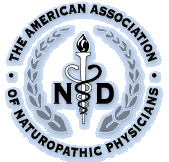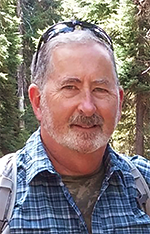
The Naturopathic Approach
History
 As a distinct American health care profession naturopathic medicine is almost 100 years old. Its roots go back through medical history to the healing wisdom of many cultures and times. At the turn of the century, practitioners of a variety of medical disciplines combined natural therapeutics in a way they hadn't been combined before, and joined together to form the first naturopathic professional medical societies. Naturopathic medical conventions in the 1920's attracted more than 10,000 practitioners. Earlier in the century there were more than 20 naturopathic medical colleges, and naturopathic physicians were licensed in a majority of the states.
As a distinct American health care profession naturopathic medicine is almost 100 years old. Its roots go back through medical history to the healing wisdom of many cultures and times. At the turn of the century, practitioners of a variety of medical disciplines combined natural therapeutics in a way they hadn't been combined before, and joined together to form the first naturopathic professional medical societies. Naturopathic medical conventions in the 1920's attracted more than 10,000 practitioners. Earlier in the century there were more than 20 naturopathic medical colleges, and naturopathic physicians were licensed in a majority of the states.
Naturopathic Medicine experienced a decline in the 1940's and 5O's with the rise and popularity of pharmaceutical drugs, technological medicine, and the idea that drugs could eliminate all disease. It has experienced a resurgence in the last two decades, as a health conscious public began to seek out alternatives to conventional medicine. As a body of knowledge, naturopathic medicine continues to grow and evolve. It incorporates those elements of scientific modern medicine that forward the knowledge of the mechanisms of natural healing and therapeutics, especially in the fields of diagnosis, immunology, clinical nutrition, botanical medicine and other clinical sciences. As an organized profession, naturopathic medicine is committed to on-going research and development of its science.
The Naturopathic Physician
 Naturopathic physicians (N.D.'s) are general practitioners trained as specialists in natural medicine. They are educated in the conventional medical sciences, but they are not orthodox medical doctors (M.D.'s). Naturopathic physicians treat disease and restore health using therapies from the sciences of clinical nutrition, herbal medicine, homeopathy, physical medicine, exercise therapy, counseling, acupuncture, natural childbirth and hydrotherapy. They tailor these approaches to the needs of an individual patient. Naturopathic medicine is effective in treating most health problems, whether acute or chronic. Naturopathic physicians cooperate with all other branches of medical science, referring patients to other practitioners for diagnosis or treatment when appropriate.
Naturopathic physicians (N.D.'s) are general practitioners trained as specialists in natural medicine. They are educated in the conventional medical sciences, but they are not orthodox medical doctors (M.D.'s). Naturopathic physicians treat disease and restore health using therapies from the sciences of clinical nutrition, herbal medicine, homeopathy, physical medicine, exercise therapy, counseling, acupuncture, natural childbirth and hydrotherapy. They tailor these approaches to the needs of an individual patient. Naturopathic medicine is effective in treating most health problems, whether acute or chronic. Naturopathic physicians cooperate with all other branches of medical science, referring patients to other practitioners for diagnosis or treatment when appropriate.
In practice, naturopathic physicians perform physical examinations, laboratory testing, gynecological exams, nutritional and dietary assessments, metabolic analysis, allergy testing, X-ray examinations, and other diagnostic tests. They are the only primary care physicians clinically trained in the use of a wide variety of natural therapeutics. They combine and tailor these treatments to the needs of the individual based on a cogent philosophy that acknowledges the patient as a participant.
The naturopathic physician has a Doctor of Naturopathic Medicine (N.D.) degree from a four-year graduate level naturopathic medical college. In states where they are regulated, naturopathic physicians must pass either a national or a state level board examination, and their actions are subject to review by a State Board of Examiners.
The Principles of Naturopathic Medicine
The principles of naturopathic medicine unite the profession. The following principles are the foundation that naturopathic medical practice is built upon.

- The Healing Power of Nature. Vis Medicatrix Naturae
Nature acts powerfully through healing mechanisms in the body and mind to maintain and restore health. Naturopathic physicians work to restore and support these inherent healing systems when they have broken down, by using methods, medicines and techniques that are in harmony with natural processes. - First Do No Harm. Primum non nocere
Naturopathic physicians prefer non-invasive treatments which minimize the risks of harmful side-effects. They are trained to know which patients they can treat safely, and which ones they need to refer to other health care practitioners. - Find the Cause. Tolle Causam
Every illness has an underlying cause, often in aspects of the lifestyle, diet or habits of the individual. A Naturopathic Physician is trained to find and remove the underlying cause of a disease. - Treat the Whole Person.
Health or disease come from a complex interaction of physical, emotional, dietary, genetic, environmental, lifestyle, and other factors. Naturopathic physicians treat the whole person, taking these factors into account. - Preventive Medicine.
The naturopathic approach to health care can prevent minor illnesses from developing into more serious or chronic degenerative diseases. Patients are taught the principles with which to live a healthy life; by following these principles they can prevent major illnesses.
Naturopathic Medical Education
Naturopathic medical colleges are four-year postgraduate schools with admissions requirements comparable to those of conventional medical schools. The degree of Doctor of Naturopathic Medicine requires four years of graduate level study in the medical sciences including: anatomy - cardiology - physiology - neurology - biochemistry - radiology - pathology - minor surgery microbiology - obstetrics - immunology - gynecology pharmacology - pediatrics - dermatology - lab diagnosis - clinical and physical diagnosis - and other clinical sciences.
Throughout the four years, there is training in naturopathic therapeutics, including therapeutic nutrition, botanical medicine, homeopathy, natural childbirth, acupuncture, hydrotherapy naturopathic manipulative therapy, and other therapies. Because the course work in natural therapeutics is added to a standard medical curriculum, naturopathic doctors receive significantly more hours of classroom education than the graduates of many leading medical schools, including Yale, Stanford, Johns Hopkins and Mayo medical schools. There are presently three accredited colleges of Naturopathic Medicine in the United States.
Bastyr University
14500 Juanita Dr. NE Kenmore, WA 98028-4966
ph=(425) 823-1300 fax=(425) 823-6222
National College
11231 S.E. Market Street, Portland, OR 97216
ph=(503)255-7355
Southwest College of Naturopathic Medicine Health Sciences
2140 E. Broadway Rd., Tempe, AZ 85282
ph=480.858.9100 www.scnm.edu
The accrediting agency for naturopathic medical programs is the Council on Naturopathic Medical Education (CNME). It is recognized by the U.S. Department of Education, and students at accredited and candidate status naturopathic medical schools are qualified to participate in federal student loan programs.
The Profession
The American Association of Naturopathic Physicians (AANP) is the unifying professional association for naturopathic medicine. Its governing body includes delegates from state level Naturopathic Associations. The goals of the AANP are to promote the public health, to maintain high standards of education and medical practice, and to encourage scientific research.
The American Association of Naturopathic Physicians supports legislation to license and regulate naturopathic physicians in all states, in order to distinguish properly trained physicians from lesser trained individuals who may present a danger to public health.
The Council on Naturopathic Medical Education is the national accrediting body for naturopathic medical colleges.
National board examinations are administered by the Naturopathic Physicians Licensing Examination
Medical specialty societies within the profession are:
- Homeopathic Academy of Naturopathic Physicians (HANP)
- American College of Naturopathic Obstetricians (ACNO)
- Naturopathic Physicians Acupuncture Association (NPAA)
American Assoc. of Naturopathic Physicians
8201 Greensboro Dr, Suite 300, McLean, VA 22102
ph=(703)610-9037 fax=(703)610-9005
Washington Association of Naturopathic Physicians
4224 University Way, Suite J Seattle, Washington 98105-5833
ph=(206) 547-2130 Fax=(206) 547-2549 WA Only=1 (800) 438-2882


